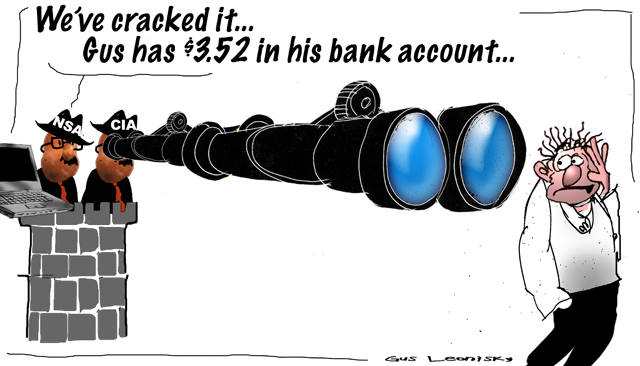Search
Recent comments
- whistleblow.....
5 hours 1 min ago - demosocialism....
14 hours 14 min ago - front cover up....
14 hours 28 min ago - the trick....
1 day 1 hour ago - bibi's wants.....
1 day 6 hours ago - gas snap....
1 day 10 hours ago - challenge....
1 day 11 hours ago - too late....
1 day 11 hours ago - spilling....
1 day 13 hours ago - US bullshit.....
1 day 13 hours ago
Democracy Links
Member's Off-site Blogs
cracking the bank code...

US and UK intelligence have reportedly cracked technology used to encrypt internet services such as online banking, medical records and email.
Disclosures by leaker Edward Snowden allege the US National Security Agency (NSA) and the UK's GCHQ are hacking key online security protocols.
The encryption techniques targeted are used by popular internet services such as Google, Facebook and Yahoo.
The NSA is said to spend $250m (£160m) a year on the top secret program.
It is codenamed Bullrun, an American civil war battle, according to the documents published by the Guardian in conjunction with the New York Times and ProPublica.
The British counterpart program is called Edgehill, after the first major engagement of the English civil war, say the documents.
'Behind-the-scenes persuasion'The reports say the UK and US intelligence agencies are focusing on the encryption used in 4G smartphones, email, online shopping and remote business communication networks.
- By Gus Leonisky at 6 Sep 2013 - 5:47pm
- Gus Leonisky's blog
- Login or register to post comments
sleeping with the encryptioners...
NSA: classification guide for cryptanalysis
Guide reveals that NSA 'obtains cryptographic details of commercial cryptographic information security systems through industry relationships
http://www.theguardian.com/world/interactive/2013/sep/05/nsa-classification-guide-cryptanalysis
closing the google door after the bytes have bolted...
Google encrypts data amid backlash against NSA spyingThe move by Google is among the most concrete signs yet that recent revelations about the National Security Agency’s sweeping surveillance efforts have provoked significant backlash within an American technology industry that U.S. government officials long courted as a potential partner in spying programs....
read more: http://www.washingtonpost.com/business/technology/google-encrypts-data-amid-backlash-against-nsa-spying/2013/09/06/9acc3c20-1722-11e3-a2ec-b47e45e6f8ef_story.html
the data market...
http://www.abc.net.au/4corners/stories/2013/09/09/3842009.htm
Every hour of every day, our digital interactions are being recorded and logged. We live in the age of 'big data', where seemingly mundane information about how we go about our lives has enormous value.
Next on Four Corners, with the help of expert data trackers, we follow the information trail of an ordinary Australian family. We follow their data over a typical day, watching as it is surreptitiously recorded by government agencies and private organisations.
Who gathers the information, what are they doing with it and what are your legal rights?
The internet has brought us conveniences once unimaginable. You can shop online, diagnose illnesses, and send 'selfies' whenever you want. But it isn't all one way traffic. Every time you use a search engine like Google, or access an 'app' on your smartphone, your activity is logged by companies around the world - many you've never even heard of.
That sometimes intensely personal data is either used or sold to make money.
At one level this could be to your advantage. Marketing and advertising is ever more accurately tailored to your wants and needs.
"The sort of products you're buying can tell a marketer an awful lot about what else you're likely to buy, you know, what model of car you're likely to buy, the political party you're likely to vote for, you know, what sort of job you're likely to have." John Ostler, Data Marketer
But where does it end, and what are the consequences? Is your information secure? Not always, Four Corners reveals.
If your user patterns are valuable and being sold on the open market, should you have a say in it? Should you be told who your data is going to, and exactly how it is being used? If your data is being matched with other data for more valuable results, should you be informed?
Four Corners' investigation reveals that not only are we being tracked online by marketers but Australia's own government agencies are secretly monitoring our digital travels.
On the road, devices in your car are being logged to register your movements.
When you pass by a police car you will be surprised to discover what modern technology is discovering about you.
This kind of information is already being used in court cases, but public officials can access your data without a warrant and without your knowledge:
"That is one of the areas of law reform that we have to, I think, take the greatest interest in. Which agencies can access this material? What can they do with it? And where on earth are the courts… where's the legal oversight that applies to a regular search warrant?" Scott Ludlam, Greens Senator
The digital detectives are in shopping centres too, where your movements can be tracked to provide a physical profile of where you go and what you do. Millions of Australians hold supermarket loyalty cards. The data you give away to get them is now being cross-referenced with data from banks to better predict your behaviour.
Companies like Google and Facebook know more about you than your family or your best friends. How did we get to this point and should we care?
No political party has ever explicitly sought your permission for this to happen.
It is a situation that alarms many experts:
"I don't think any social system, any government, can survive knowing everything about its citizens without ultimately that being corrupted." Danny O'Brien, Privacy Advocate
"In Google We Trust", reported by Geoff Thompson and presented by Kerry O'Brien, goes to air on Monday 9th September at 8.30pm on ABC1. It is replayed on Tuesday 10th September at 11.35pm. It can also be seen on ABC News 24 on Saturday at 8.00pm, ABC iview and at abc.net.au/4corners.